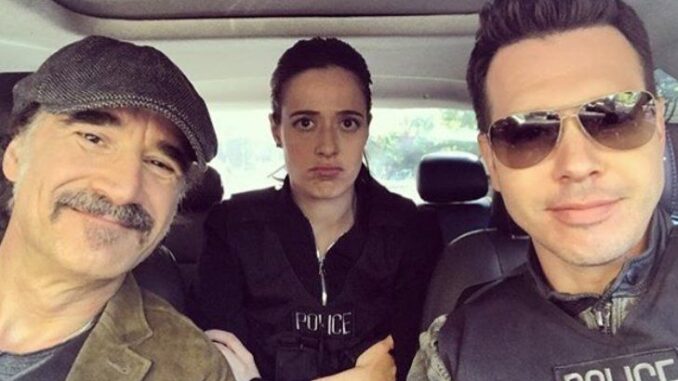There are deaths on television that exist purely to shock. And then there are those rare, heart-wrenching losses that reshape a show forever. The death of Alvin Olinsky on Chicago P.D. was the latter. It wasn’t just a tragic plot point—it was the unraveling of a relationship, a man, and a team. For many fans, it marked the moment Chicago P.D. moved from gritty procedural to emotional tragedy. Because Olinsky wasn’t just another detective. He was the conscience of Intelligence. And when he was gone, nothing felt right again.
From the very beginning, Alvin Olinsky was a quiet force. He didn’t need the spotlight. He didn’t deliver dramatic monologues. But every look, every choice, every sigh—he carried decades of wisdom and pain. He was the guy who’d seen it all and didn’t flinch. He was loyal to a fault, particularly to Hank Voight, the morally complex leader of Intelligence. Their bond ran deeper than the badge. They were more than partners. They were brothers.
And that’s why Olinsky’s death wasn’t just a narrative decision. It was a symbolic execution of everything that held Voight together. The arc that led to Olinsky’s death began like many others—a case gone wrong, a powerful enemy, a frame job. But this time, the enemy played smart. He struck not with bullets, but with the law. Olinsky was arrested for a crime he didn’t commit: the murder of a man Voight had actually killed. Olinsky, true to his code, said nothing. He kept quiet. He protected his friend. And in doing so, he sealed his fate.

The episode where he dies is brutal in its restraint. There are no grand goodbyes. No final messages. Just a moment of violence in prison—a stabbing. Then the hospital. Then silence. And when Voight finally gets the news, the screen doesn’t cut away. We’re left staring at his face, at the weight settling in his eyes, as he realizes that his best friend is dead—and it’s his fault.

Voight doesn’t scream. He doesn’t cry. He just collapses inward, like a building imploding under years of pressure. It’s one of the finest acting moments in the series, and Jason Beghe delivers it with devastating precision. For fans, the loss was too much. Social media exploded. Viewers flooded Twitter and Facebook with tributes to Olinsky. Memes, quotes, videos of his best scenes. Hashtags like #JusticeForOlinksy trended. But it wasn’t just about the character. It was about the emotional foundation he represented.
Because Olinsky was the only one who could truly hold Voight accountable. He didn’t challenge him with speeches, but with presence. When Voight crossed the line, Olinsky’s silence said more than any protest ever could. He was the barometer of morality in a world drowning in gray. And now he was gone. The show changed after that. Voight changed. He became colder, more volatile, more alone. Not even the addition of new team members could replace what was lost. Because Olinsky wasn’t just a character. He was history. He reminded us that the Intelligence Unit had a past, scars, and codes that couldn’t be replaced with protocol. The genius of the writers was in their refusal to let the audience move on. For seasons after, Olinsky’s name still haunted the script. Every time Voight visited his grave. Every time someone whispered “He died for you.” Every time Voight hesitated before breaking the rules—Olinsky was there.
One of the most powerful scenes comes episodes later, when Voight finally admits, through gritted teeth, that he failed Olinsky. That he couldn’t save him. That he didn’t do enough. It’s the kind of raw honesty that only grief can pull out of a man like Voight. And it makes you wonder: Was that the day the real Hank Voight died too? Fans weren’t the only ones grieving. Within the show, the team splintered. Ruzek grew more reckless. Atwater became more reserved. Upton hardened. There was a vacuum in the room that no new recruit could fill. Because Olinsky wasn’t just good at his job. He was good for the people around him. He taught, protected, and listened.
Let’s not forget the performance behind the character. Elias Koteas gave us a version of Olinsky that felt lived-in, textured, and tragically human. He wasn’t flashy. He didn’t deliver weekly one-liners. He simply was. And that’s what made him unforgettable. He brought depth and soul to a show often driven by adrenaline and chaos. There are many episodes of Chicago P.D. that deliver twists, thrills, and action. But few deliver grief the way this one did. Real grief. The kind that doesn’t resolve in 42 minutes. The kind that lingers in your chest, months—even years—later. The kind that makes you rewatch scenes just to feel it again.
In losing Olinsky, the show forced us to reckon with what loyalty really means. It asked questions most police procedurals never dare to: What happens when your loyalty kills the person you love? How far can you bend your values before they break everything you stand on? And can justice still exist when it costs you your soul? Today, fans still mention Olinsky in comment threads, tribute posts, and reunion requests. Because some characters don’t fade with time. They become the heartbeat of a story—even after their final scene.





